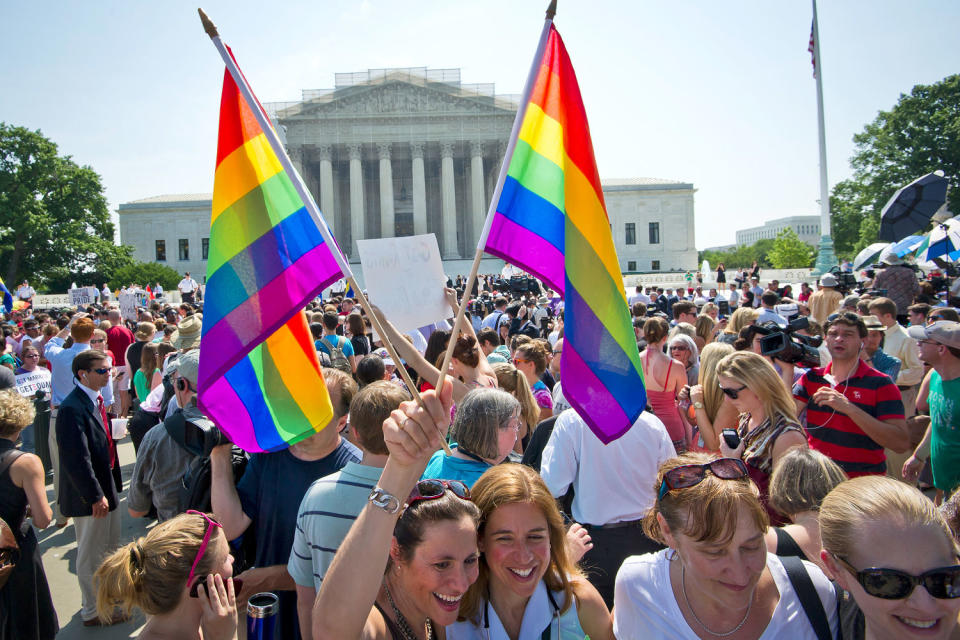The Republican Party platform, updated last month for the first time since 2016, appeared to move away from the party’s longstanding opposition to same-sex marriage.
The party’s previous platform included at least five references to marriage as a union exclusively between “one man and one woman.”
A section of the new platform, titled “Empowering American Families,” says “Republicans will promote a culture that values the sanctity of marriage, the blessings of childhood, the fundamental role of families, and supports working parents. We will end policies that punish families.”
Many took this to mean that the party was softening his stance on gay nuptials in a tribute to growing public support for same-sex marriage, even among republicans. However, some academics and critics say that the language of the new platform is almost synonymous with previous “one man and one woman” references and does not mark a change at all.
The Republican National Committee did not return multiple requests for comment on whether the new platform’s language includes same-sex couples.
Charles Moran, president of Log Cabin Republicanswhich describes itself as “the nation’s largest Republican organization dedicated to representing LGBT conservatives and allies,” said the change means the party has “come full circle” and intentionally includes same-sex couples.
“The Republican Party was imposing constitutional bans on gay marriage in the 2004 presidential election, and now we’re at a point where, 20 years later, the Republican Party platform is completely caught up with where society is and, honestly, the majority of Republicans they also defend respect for LGBT equality. I appreciate the language. Talks about serving the sanctity of marriage; This includes our marriages as well.”
Moran described the platform as “a Donald Trump platform for a modern Republican Party” that is “much broader and much less exclusionary of people and, again, specifically LGBT people.”

But Robin Maril, an assistant professor of constitutional law at Willamette University, said LGBTQ people should not see the language change “as a victory in any way.”
Maril has noted several instances over the past half-century in which the phrase “sanctity of marriage” has been used by religious figures, by Republican officials, and in legislation to ban same-sex marriage.
In 1978, the U.S. Conference of Catholic Bishops issued “An Agreed Declaration on the Sanctity of Marriage”, which defined marriage as a union that “unites a man and a woman” and as an important basis for having children.
Decades later, in 2004, after a Massachusetts court ruled that the state must allow same-sex couples to marry, President George W. Bush called the court’s decision “deeply troubling,” Los Angeles reported at the time. Angeles Times.
“Marriage is a sacred institution between a man and a woman,” Bush said in an affirmation. “If activist judges insist on redefining marriage by court order, the only alternative will be the constitutional process. We must do what is legally necessary to defend the sanctity of marriage.”
Weeks later, Bush announced its support for a constitutional amendment that prohibits same-sex marriage.
Then, in 2006, Alabama voters ratified the “Alabama Sanctity of Marriage Amendment”, which made it unconstitutional for the State to recognize or perform marriages or civil unions between people of the same sex.
The phrase “sanctity of marriage,” Maril said, is “inherently exclusionary” of same-sex couples.
“Basically, by being able to use this language, they exclude without having to say it,” said Maril.
Gabriele Magni, associate professor of political science at Loyola Marymount University and director of the school’s LGBTQ+ Policy Research Initiative, agreed with Maril, adding that using a more vague phrase like “sanctity of marriage” allows the party to avoid explicitly excluding Republican voters. LGBTQ. while satisfying conservative and religious voters.
The GOP platform’s section on marriage, Magni noted, also includes the phrases “the blessings of childhood” and “the fundamental role of families,” which are reminiscent of the party’s previous positions on marriage, which emphasize the importance of procreation. and a traditional nuclear family. which excludes same-sex couples.
“Reading the lines, it seems quite obvious that they suggest procreation as the goal of the family,” Magni said.


Moran described the examples Maril gave of how the “sanctity of marriage” has been used historically as “obscure references.”
“So I’m not going to go down that path of recognizing the left-leaning academics who are sitting here once again trying to analyze any kind of progress made by Donald Trump and the Republican Party,” Moran said. “It’s absurd, and the most important thing here is that it includes our marriages and relationships too.”
The few other mentions of LGBTQ people in the new Republican Party platform focus on transgender people, who have been the target of hundreds of bills in recent years that seek to restrict their access to public bathrooms, sports teams and social security documents. identification consistent with their gender identities. and limit or completely prohibit access to transition-related medical care.
A section of the updated platform titled “Knowledge and Skills, Not CRT and Gender Indoctrination” says Republicans will “defund schools that engage in inappropriate political indoctrination of our children using federal taxpayer dollars,” alluding to the conservative effort in recent years to restrict LGBTQ-inclusive curricula and notify parents before a student can use a different name or pronoun.
And in a section titled “Republicans Will End the Left’s Gender Insanity,” it says that Republicans will continue to support efforts to ban trans girls and women from women’s sports, ban taxpayer funding for gender-affirming surgeries, “prevent that taxpayer-funded schools promote gender transition” and “reverse Biden’s radical rewrite of the Title IX Education Regulations and restore protections for women and girls.”
Moran said Log Cabin Republicans support restrictions on transitional care for minors, which have become law in 25 states.
“The way I describe it is that 80% of this country supports equality for the L’s, the G’s, the B’s and the T’s, but there have to be some protections around that, and that includes preserving women’s spaces, protecting women’s sports. and Title IX, parental consent at all levels and no permanent gender transition for those under 18,” Moran said.
Magni said the parts of the new platform that mention LGBTQ people, without including the phrase “sanctity of marriage,” represent a notable change from the rhetoric used in this year’s Republican primaries. The Republican presidential candidates, he said, were trying to be seen as the most conservative, but the party itself could be trying to please more moderate voters and the majority of voters who support LGBTQ protections rights.
“I think they know that if they want to win the election, and they want to win in swing states, they need to convince some moderate or independent voters to vote for the Republican Party,” Magni said. “They will not convince them by adopting their extreme position on LGBTQ+ rights. They would prefer these topics not to be the center of the conversation, which is probably why they don’t mention them very often or very explicitly on the platform.”
The platform’s use of the “sanctity of marriage” rather than an obviously exclusionary definition of marriage could help LGBTQ Republicans who are in a same-sex marriage “feel better about their vote,” Maril said.
“But I don’t think that would be based on history or the way this term has been used socially or legally over the last 20 years,” she said.
For more from NBC Out, sign up for our weekly newsletter.
This article was originally published in NBCNews. with






































